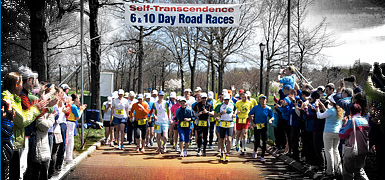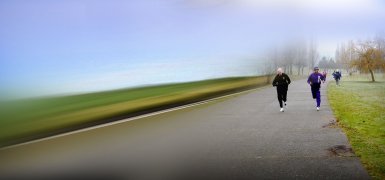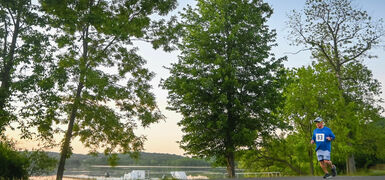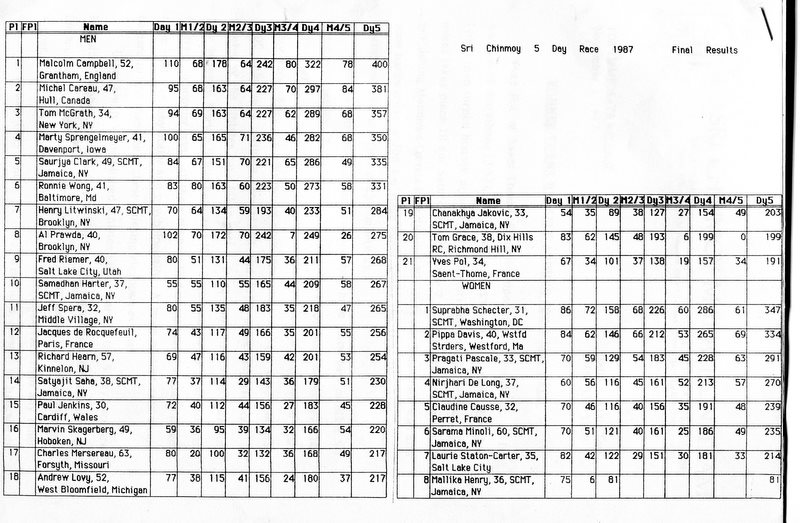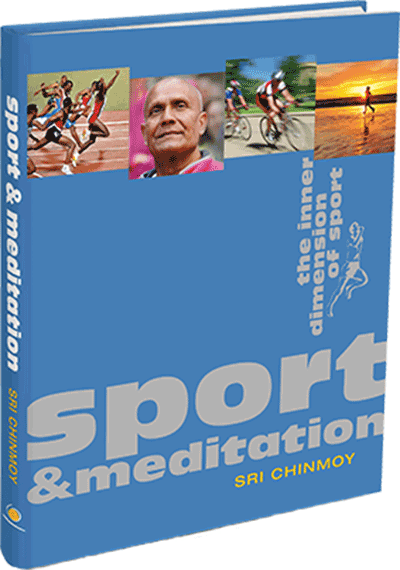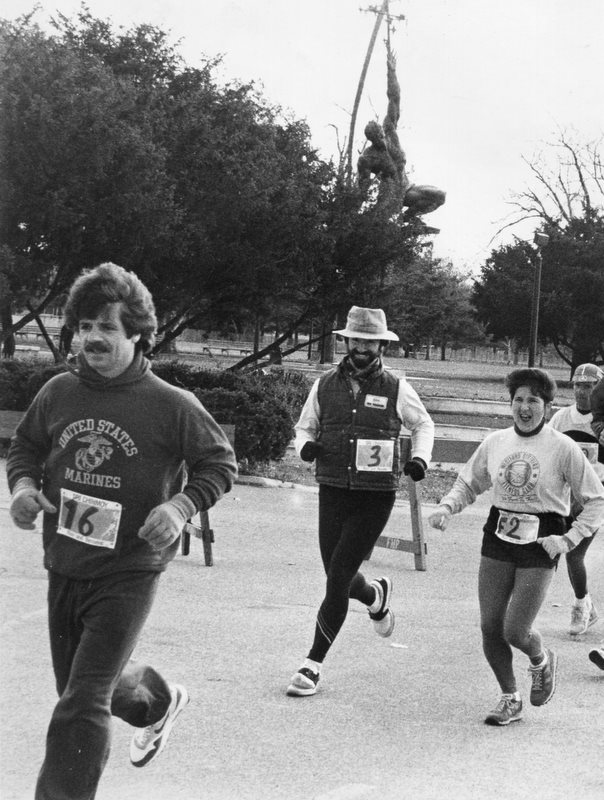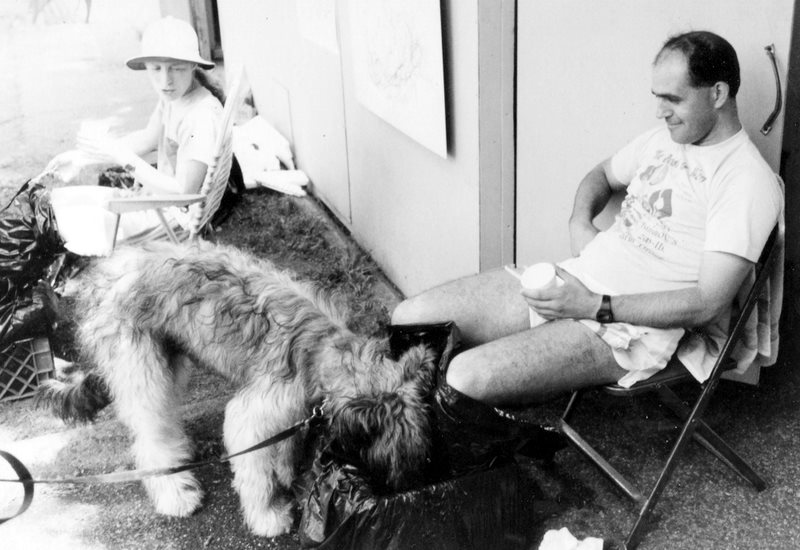What is it like to run a multi day road race for the first time? Laurie Staton-Carter found out when she ran in the Sri Chinmoy 5 Day Race in Flushing Meadow Corona Park, November 7-12, 1987.
The following is taken from the January-February 1988 issue of UltraRunning and reprinted by permission from the Publisher, John Medinger, titled "A McDonald's Cheeseburger Never Tasted So Good", by Laurie Staton-Carter.
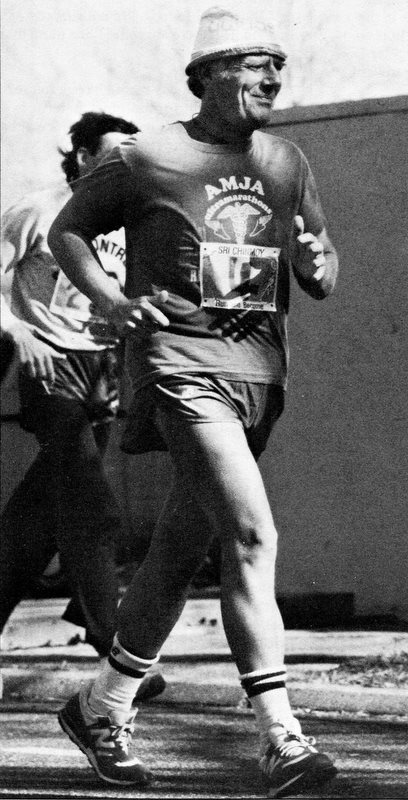 I had wanted to run a multi-day race for a long time, ever since I had read about Marcy Schwam, Ed Dodd, Park Barner, and Wes Emmons running in the second Edward Payson Weston Six-Day Race in 1981. The book I had, written by Ed Dodd, was mostly pictures. There were pictures of people running, eating, sleeping, being cared for; they were taken at night, in the early morning in the heat of day; the runners were alone on the track, or with handlers at the aid stations, or, at the end, running with everyone else in the race on the final lap. There was a short text; but the pictures of their faces told the story, not the words.
I had wanted to run a multi-day race for a long time, ever since I had read about Marcy Schwam, Ed Dodd, Park Barner, and Wes Emmons running in the second Edward Payson Weston Six-Day Race in 1981. The book I had, written by Ed Dodd, was mostly pictures. There were pictures of people running, eating, sleeping, being cared for; they were taken at night, in the early morning in the heat of day; the runners were alone on the track, or with handlers at the aid stations, or, at the end, running with everyone else in the race on the final lap. There was a short text; but the pictures of their faces told the story, not the words.
Photo: "He may not be the youngest or the slimmest, but Malcolm Campbell is certainly among the best at multi-day racing - just six weeks earlier he had won a 15-day race in Texas." Photo by Ranjit
I had long dismissed multi-day running as too far, too long, too crazy. Yes, I run 100-milers, but I'll never do something like that. Mostly they were too scary, I discovered in the days before I flew to New York.
Sheer terror drove me through the first fifty miles in under ten hours. I was on the edge of tears the entire first day, overwhelmed by the tremendous support we received from the race staff and the other runners, overwhelmed by all of the legendary people that I was running with, overwhelmed that I was doing something that I had wanted to do for years. Multi-day runners have given me much inspiration, especially Marcy Schwam, and also Don Choi, Park Parmer, Malcolm Campbell, and Marvin Skagerberg. I have also been inspired by the nineteenth-century pedestrians Sir John Astley, Edward Payson Weston, and Daniel O'Leary. But it wasn't until I had been running in Flushing Meadows Park for a couple of days that I realized the significance of those multi-day races of old. People kept asking me if this was my first ultra. "Oh, no," I would say. "I've done seven 100-milers and a 24-hour and lots of 50 milers and..." They would smile as they realized my perspective. To people associated with multi-day running, multi-day races are ultras. I had my sense of historical perspective radically altered that day.
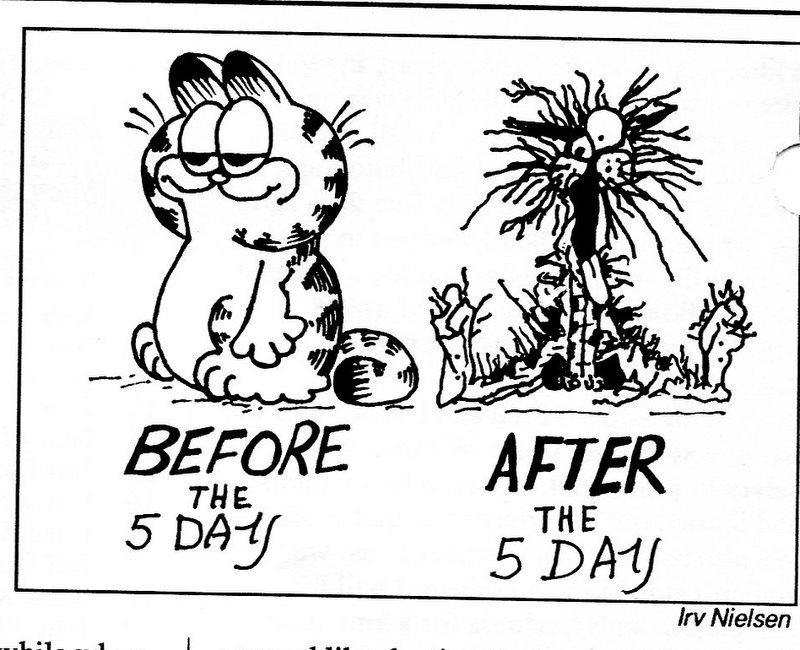 Pippa Davis, a British woman of 40 now residing near Boston, is a talented multi-day runner. She is very talkative, unassuming, and great to spend time with. We became friends sometime shortly before the race started, when she came over to my tent - I was trying to neatly organize five days worth of clothing, shoes, and gear into a two-person backpacking tent - to introduce herself and give me a little advice to start the race with. I don't take advice too seriously, and didn't at this time either, but as the days wore on, I welcomed a ten-minute lecture on blisters or swollen feet or anything that Pippa would tell me about this totally foreign kind of running we were doing. She was very helpful, always, and very encouraging, especially when she knew I was having a rough time of it. Pippa was with me as I completed my 200th mile. We were also kindred fashion spirits, as practically everything she owned was purple.
Pippa Davis, a British woman of 40 now residing near Boston, is a talented multi-day runner. She is very talkative, unassuming, and great to spend time with. We became friends sometime shortly before the race started, when she came over to my tent - I was trying to neatly organize five days worth of clothing, shoes, and gear into a two-person backpacking tent - to introduce herself and give me a little advice to start the race with. I don't take advice too seriously, and didn't at this time either, but as the days wore on, I welcomed a ten-minute lecture on blisters or swollen feet or anything that Pippa would tell me about this totally foreign kind of running we were doing. She was very helpful, always, and very encouraging, especially when she knew I was having a rough time of it. Pippa was with me as I completed my 200th mile. We were also kindred fashion spirits, as practically everything she owned was purple.
The first day had blissfully wonderful running weather. The temperature was near 60, but with a strong wind that never stopped during the entire five days. I was shooting for 60-75 miles in the first 24 hours, but took a sleep break after covering 65 miles. I awoke feeling good and covered 17 more miles in the first 24 hours. I felt great. I kept remembering what I thought I had heard Pippa say at some point early in the race, perhaps not all that seriously: "After the race you will be changed forever". I hadn't asked her to elaborate.
About 36 hours into the race, my hamstrings got so tight that I couldn't run any more. My quads were also shot, and my movement along the course became very slow. This was Sunday night and the race wasn't even going to be over until Thursday. Now I was overwhelmed by the fear that I was injuring myself permanently and that I would never run again. I went off the track for a sleep with not many miles covered that day, the wind blowing relentlessly across the park, my neatly folded piles of gear untouched in my tent. When I told my lap counter I was going to sleep she asked, again, if I wanted to be awakened. No, I didn't. As I slowly hobbled to my tent, I told myself that I would quit. After all, I'd trained hard and had a good year. A little rest would be a fitting reward. It would feel so good to lie down and not have to get up and run any more.
I awoke to the tapping sound that a Chronomix makes as the seconds advance. My tent was 25 feet directly behind the women's medical hut. It was dark, except for the lights of the aid station and the park street lamps. In a couple of minutes I heard a lap counter say, "Malcolm, that's 153. Gotcha." Then, a minute later, "Marty, that's 145. Gotcha." Then, "Malcolm, that's 154. Gotcha. Pippa, 126. Malcolm, 155. Gotcha." I drifted off again, dreaming that I was still running, but not sure if I was dreaming it or it was for real.
When I woke up Monday morning at about 4:30, I couldn't stand it any more. I had to get out and at least see if I could move around. I took my first lap of the day in absolute agony and saw fellow Wasatch Alpine Strider and multi-day aspirant Fred Riemer as I came into the aid station. "How's it going," he asked, sounding tired but genuinely interested. I burst into tears, unable to hide my disappointment in not being able to run any more, the pain and fear of being injured, and the vague possibility that all of my worst nightmares were coming true. He comforted me as best he could. He was having problems too, but he had just had a massage and was going to give it a go. I headed for the women's medical tent for extensive chiropractic and massage. In the second 24 hours, I managed to cover only 42 more miles.
I spent all day Monday in and out of the medical hut. I'd get a chiropractic treatment that would work wonders and I'd walk in relative comfort for a few laps. Then, everything would hurt again and I'd go back for another massage. I ended up doing acupressure on myself for several hours. I was pleased that it seemed to be working and that there was something that I could do to sort of revive myself.
Sometime in the afternoon, after I had come around another lap, I was over at the water stop checking out the various drinks and OWWWW! I had just stepped down on my left foot and it felt like a searing coal. I limped directly to the medical hut where I was given a lance to drain my blisters. But they wouldn't be drained, somehow inaccessible to my jabbing lance. We constructed foam doughnuts to cushion them. They still hurt a lot, but at least I could stand on them and move around.
The blisters, deep and painful, right on the ball of my left foot, soon developed on my right foot. It seemed they were caused by fluid accumulating around the metatarsal joints, due to the swelling of my feet, and had somehow developed from the inside of my foot. By Monday night, I was slowed to a lurching, painful walk, taking about 20-25 minutes per mile. Every mile was a major accomplishment. I saluted my lap counter after every lap, waiting to hear her confirm that I had completed one more mile. Fred was having problems with his knee and ankle and was going at about the same speed. As darkness fell, little drops of rain began falling.
The wind picked up and it started to rain. On one of the few laps that Fred and I ran/walked together, we were telling each other what had gone wrong and that we weren't even half-way through until 10:00 that night, and about how, if either one of us had looked this bad one day earlier, we would have been tempted to shoot ourselves. After a while Yves Pol came strolling by. Yves is a short, tiny Frenchman who amused us with his singing what sounded like opera or various national anthems, in falsetto, in French. Yves, not knowing our harrowing predicament, came up behind us, walking, and we somehow managed to scurry along at our best 3 mph pace to stay with him. Soon, we were laughing so hard that tears were rolling down our checks.
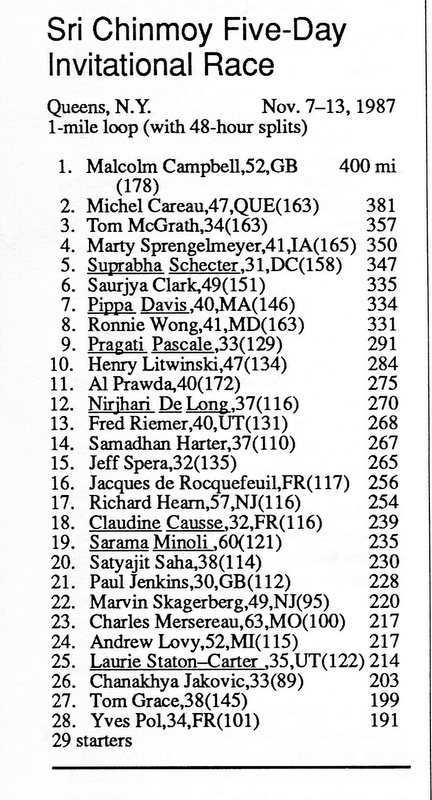 I got into this routine starting Tuesday. It was still raining, but I'd get up and get out of the tent whenever I felt like it. Sometimes it was 5:00 am, sometimes it was almost 7:00. I would go straight to the medical tent to get ready to roll. After my feet were prepared and my legs were massaged I would get out and move around. Then I'd hit the kitchen for this wonderful oatmeal that a woman named Ghelahti would fix up. There was usually either French toast or scrambled eggs too.
I got into this routine starting Tuesday. It was still raining, but I'd get up and get out of the tent whenever I felt like it. Sometimes it was 5:00 am, sometimes it was almost 7:00. I would go straight to the medical tent to get ready to roll. After my feet were prepared and my legs were massaged I would get out and move around. Then I'd hit the kitchen for this wonderful oatmeal that a woman named Ghelahti would fix up. There was usually either French toast or scrambled eggs too.
Somehow I got to know Marv Skagerberg, the guy who had raced across the country with Malcolm Campbell. It was Tuesday night and it had been raining hard all day. Fred and I had miraculously managed to get someone to bring us each a slice of cheese pizza (Sri Chinmoy folks are very vegetarian) and we started to crave something for dinner other than pasta pinwheels. I had been walking around with Marv for a while when he mentioned something about burgers. "Yeah," he said, "McDonald's cheeseburgers. I had a guy bring me a couple of them last year. You can put them in your tent and stick them in the microwave when the kitchen staff goes home, between midnight and six in the morning. They keep, you know." I was crazed. Real cheeseburgers? I'd give anything for a cheeseburger. It took me a lap to come to my senses and form a plan, and the very next time I saw Marv I made him promise to cut me in on any cheeseburger deals. A few laps later he informed me that he'd be meeting his ladyfriend down at the far end of the straightaway (away from the aid station) to discuss burgers. In the pouring rain and the dim light of a street lamp, we met to close the deal. We kept an eye out for anyone who would leak the info about us and the burgers. I said that I wanted one, and Fred would want one, so make it two. Several laps later, Marv's ladyfriend returned and met us on the dark side of the aid station. She pulled a bag of burgers from under her trenchcoat (really and truly) and we quickly slipped them into our Gore-Tex jackets. The next morning, at about five o'clock before the kitchen staff arrived, I had a sumptuous breakfast of a McDonald's cheeseburger. It was heavenly.
I went into the medical hut again after covering my 200th mile. As I was lying there on the massage table I heard the pouring rain stop. People were yelling and hollering and sure enough it had started to snow. It was beautiful. The pinkish glow from the street lamps was reflected off the pavement by the rapidly forming ice, and everything was light and quiet. I was back to walking again, but I was having a ball. I will never forget seeing Fred coming around the end of the straightaway - wearing his silver Gore-Tex pants, a red Gore-Tex anorak, and a grey knit cap; he was slowly, ever so slowly, making his way down the track. He was running. He was absolutely focused on something far, far away, because he didn't notice that we were passing each other. His cheeks were rosy and his breaths came out in puffs. Everybody was out on the course on Wednesday night, putting in the miles, even if it meant stopping every two miles for breaks. Wednesday night was like magic. It seemed like the time had gone so fast and in the morning it would be over. We had gotten very close, all of us, and we kept each other going. It was a very special evening.
After 203 miles I rewarded myself with a shower at the Tennis Center. Then I went to sleep not caring when I woke up.
I awoke just before dawn to a gorgeous, clear morning. Everyone was out running their brains out. I suddenly hustled to be out there. I got my oatmeal and the best waffles I have ever tasted, to go. My right ankle had started to swell and was now very painful to walk on. I put ice bags in my sock and was off. I began limping around the track, so happy that the race was still on, that all of my race-mates were still out there going around. We were in twos and threes and groups, trading stories and talking about anything and everything, from our last birthday gifts to family holiday traditions. The sun was shining brightly as the days dwindled to hours and the hours to minutes and seconds. Malcolm finally reached 400 miles, and Pippa was headed for a PR of 334, 17 miles shy of first place among women, which went to Suprabha Schecter. Suprabha had been in a trance for days, finally slowing to a walk toward the end. As the last hour approached I figured out how many miles I could cover at my ungainly 19-minute pace. Instead of going out for partial laps in the last 15 minutes, everybody started to congregate around the Chronomix, waiting for the last of us to finish our final laps. I scurried as fast as I could, swinging my arms and throwing my entire soul into the final lap. I turned onto the straightaway and went for it. I couldn't run, but I was moving. I was squinting to see the seconds on the Chronomix. Would I be able to finish the lap before the clock turned over 120 hours? As I got closer, I could see the numbers, 43, 44, 45, 46...; then 52, 53, 54 seconds. I really wasn't sure I was going to make it! I was the only one left out on the track. Then the seconds turned to 55 and I had to run. I lurched past the clock with three seconds to spare.
Everybody was cheering - the runners, the lap counters, the masseuses, the cooks, the winos in the park. Had we really been out there for five days? Couldn't have been. It seemed like it went so fast...
Fred and I got to the awards ceremony a little late. Everybody was clean, in regular clothes, sitting around tables. It was quiet. Some gave short speeches. We all got our awards, each with a big color photograph of us all, posed at the start, only five days ago. As my name was called I went up to the front of the room and was handed a bouquet of fresh flowers and my framed award. I couldn't say anything, so just whispered thank-you.
At the airport, Fred and I headed for the bar to wait for our flight. We treated ourselves to some Beck's beer in frosty mugs and toasted our experiences of that week. We also had our pictures next to us; we couldn't stop looking at them. I will look at that picture with fondness for a long time. Fred is absolutely right; the New York road racing scene is the greatest.

